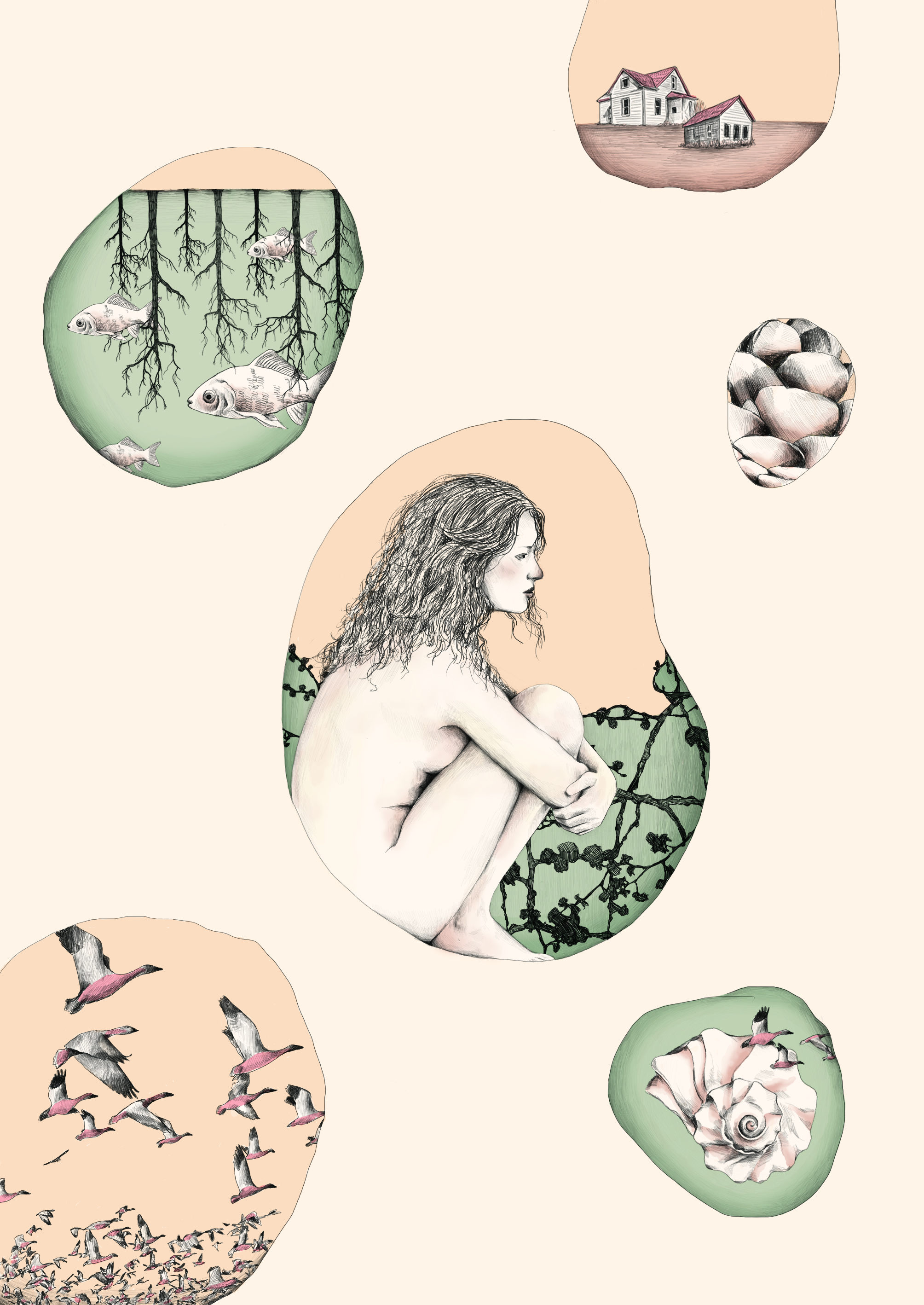by Stephanie King
On discovering a man I was secretly in love with wrote a poem portraying me in an unflattering light
2013 Fiction Prize Winner
Kit never campaigned for gay marriage but I could see him with an equally handsome, immaculately dressed man raising good-looking, impossibly well-mannered children. I wondered whose genes these children would have.
“Kimiko, if you can’t find anyone else,” Kit said, but he didn’t say anything more or indicate what I was supposed to be finding them for.
“I know,” I said. “I’ll think about it.”
I did think about it: would our children be tall? Who would they live with? Would we raise them to be Jewish? Would they call us “Mom” and “Dad,” or would we think of something better? I would have dismissed it as a frivolous fantasy, brought on by too much Chianti. Instead, two weeks later, Kit’s mother died.
When we were teaching in Missouri, I went to Boston over one of our winter breaks and stayed with Kit’s family. It was clear to me that they thought I might be a girlfriend, even though he had told them I was just a friend, and they obviously should have suspected what he would eventually tell them. His mother was very uneasy around me, and Kit and I would make fun of her in whispers after everyone else had gone to bed. I was sleeping on the guest sofa in the basement; for Kit to have a woman he was not married to in his bedroom would have been scandalous.
“You have to tell them,” I told Kit.
“I can’t,” he said. “They still send me money once in a while. I’m not ready for them to never speak to me again.”
“They love you,” I said.
I could see that this was true. His mother sometimes ruffled his hair when she walked by him. He was an only child and had apparently been a difficult birth.
“When has love ever meant that you can’t hurt someone until they want to die?” he asked.
I hated it when he was right. He didn’t tell them that trip, or the next, or the one after that. To this day I don’t think he has ever had “the conversation” with his father. He told his mother and it went as well as could be expected: she cried a lot and bemoaned the loss of her theoretical grandchildren.
“What about your friend?” she asked. “The exotic one, what’s her name?”
“No, Mom,” he told her.
“You could marry her,” she said. “You could marry anyone. I don’t care what you do in your spare time.”
His entire life was her spare time. I don’t know what his response had been. Now she was gone, and he would never be able to make her understand.
We planned to take the train together back to Boston for the funeral, so neither of us would have to sit next to a stranger. The train was early the next morning and Kit came to stay over. I left a note that afternoon on his desk,
On Using Sushi to Solve Your Emotional Problems
happiness bundles
little fish wrapped up in rice
when can I eat you?
“You’re racist,” Kit said. “You’re always making some kind of Asian food. Can’t you ever make a pizza?”
“Shut up or I’ll make you eat gefilte fish,” I said, neatly rolling spicy tuna rolls.
We ate sushi and drank sake, and when the
sake was gone we moved on to pouring rum into cans of Coke. Eventually, we were quite drunk.
“Read me the poem,” Kit said.
I refused. I didn’t even want to look at it again, much less read it out loud. Even though I had been reading it approximately once an hour, and sadly, the text of it never changed. It was exactly parallel to the way I used to check my voicemail every hour to see if Andrew had called.
“I can buy a fucking Ploughshares at any Barnes & Noble,” Kit said. “You’re not fooling anyone in your misery.”
Maybe, if his mother had not just died, if his blue eyes weren’t as bloodshot as someone with chronic allergies or alcoholism, I wouldn’t have shown him. As it were, I felt guilty for making a big deal of my tiny suffering. Being jilted by some moderately successful poet was nothing compared to losing a parent. If I were my mother, I would have told me to be ashamed of myself. Of course, my mother was not aware that until recently I had been sleeping with an engaged man.
He read it, his smile getting bigger as his eyes scanned each line. It was two pages long. When he was finished, he laughed.
“He sucks,” Kit said.
I agreed, but I still thought it was a good poem. Better to be immortalized in a good poem than a bad one.
“Let’s have a baby,” I said, changing the subject.
“Okay,” Kit said.
In retrospect, it was probably not the best idea to get drunk and sleep with anyone who would say “okay” upon having a baby proposed to them. But like so many other things, it seemed a good idea at the time.
I had tried on clothes in front of him, we had been skinny dipping, but nothing was as embarrassing as getting undressed that night. We both hurried and slithered under my cool cotton sheets with only swiftly sneaked peeks at one another. He still seemed to think it was a good idea, right up until the point where he first touched me, his hand clammy and pale as milk on my shoulder.
“I need to be drunker for this,” Kit said.
“Thanks a lot,” I said.
“Shut up,” he shot back. “Have you ever slept with a woman?”
He had a point. We lay there for a while next to each other, lightly.
“Go to sleep,” I said, curling up against him like a shrimp. “Next month we can try the turkey baster.”
“That’s disgusting,” he said. “You’re an attractive woman. That would be an insult to you.”
I made him go to sleep anyway, and I thought I would lie awake a long time, thinking, but I fell into sleep easily and dreamed that I was gently rocking on an ocean, although it may have just been the room spinning from all the sake.
When my dad’s father died, we sat shiva and ate egg-salad sandwiches and looked miserably at one another. Kit’s family was drunk from the day before his mother’s funeral and stayed that way through the interment. I had met several of his copious cousins before, on their various visits to D.C., and they all greeted me warmly, lots of huge hugs followed by wet kisses on the cheek. I normally shrank from such open affection but tried to handle it gracefully.
I was staying in Kit’s room, sleeping on the floor. Strange that even after he came out I still had to sleep downstairs, but with his mother gone that was the first place they put me. She had a heart attack at the surprising age of 54, and I was grateful that it was not from the shock of anything Kit might have told her.
The night they put Mrs. Maldonado in her final resting place, after everyone had passed out drunk, I was awake in my sleeping bag on the floor next to Kit’s bed. His breathing was sharp and irregular and I thought he might be crying, but I didn’t want to embarrass him. Instead, I stared up at the ceiling, noticing that at some distant point in the past he had mapped out the northern sky in glow-in-the-dark stars, which had lost most but not their entire glow. A hand reaching down startled me; Kit asked if I was awake and I told him I was now.
“When I was little, my mom used to come in and read me stories when I got scared,” he told me. “She used to say that was why I became an English tea-
cher, because I liked to read stories to kids.”
I told him I was sorry, but those words felt so inadequate slipping from my tongue that I didn’t say anything more. There was more of the ragged breathing that might have been crying, which gradually subsided to the kind of long, even breaths that indicated deep thinking or the onset of sleep.
“I’m ready,” he said. “Are we going to do this?”
“Okay,” I said, slipping out of the sleeping bag and up into the bed.
Six months later, my first published poem appeared in Modern Haiku.
On Hearing of Your Mother’s Death
petals unfurling
also inside, unnoticed
grief makes us careless
“See,” Kit said. “Nature and the turn—you paid attention during your own haiku lesson.”
“You’re insufferable,” I said. He rubbed my feet while I read the rest of the magazine.
I considered clipping it and sending it to Andrew, but decided I was better than that. I had heard from mutual friends that his new on-the-side girlfriend was a twenty-one-year-old bank teller with red hair and freckles, and she apparently thought Andrew was quite the intellectual. There was no word on whether Andrew and Lisa had decided to start their open family, or if the nanny would be off-limits.
My mother was very proud for me to have been published, although she would be much prouder to find out that she was finally going to be a grandmother. I was two months along and hadn’t told her yet; my defense was going to be that I wanted to be “sure.” She was suspicious when Kit and I rented a three-bedroom house in a gardeny little subdivision in Silver Spring. With Kit’s mother gone, there was no one to comment on the scandal of our living in sin, in spite of our neatly arranged separate bedrooms.
“Why so many rooms, for just you two?” my mother asked, before Kit offered to show her our great kitchen, all blond wood and airy windows. He had bought matching kitchen towels in his excitement.
It had taken five increasingly embarrassing incidents to produce our future offspring. Kit’s response when the second pregnancy test showed the desired plus sign: Thank God, I never have to do that again. I guess I should have been offended.
I didn’t forward any of my magazines to my new address. I would just rather not know.
Stephanie King received her MFA from Bennington College and won the 2006 Quarterly West Novella Prize. She lives in Philadelphia.
2013 Fiction Prize Winners
The articles in this special section:

On discovering a man I was secretly in love with wrote a poem portraying me in an unflattering light
by Stephanie King
2013 Fiction Prize Winner

 Please wait...
Please wait...